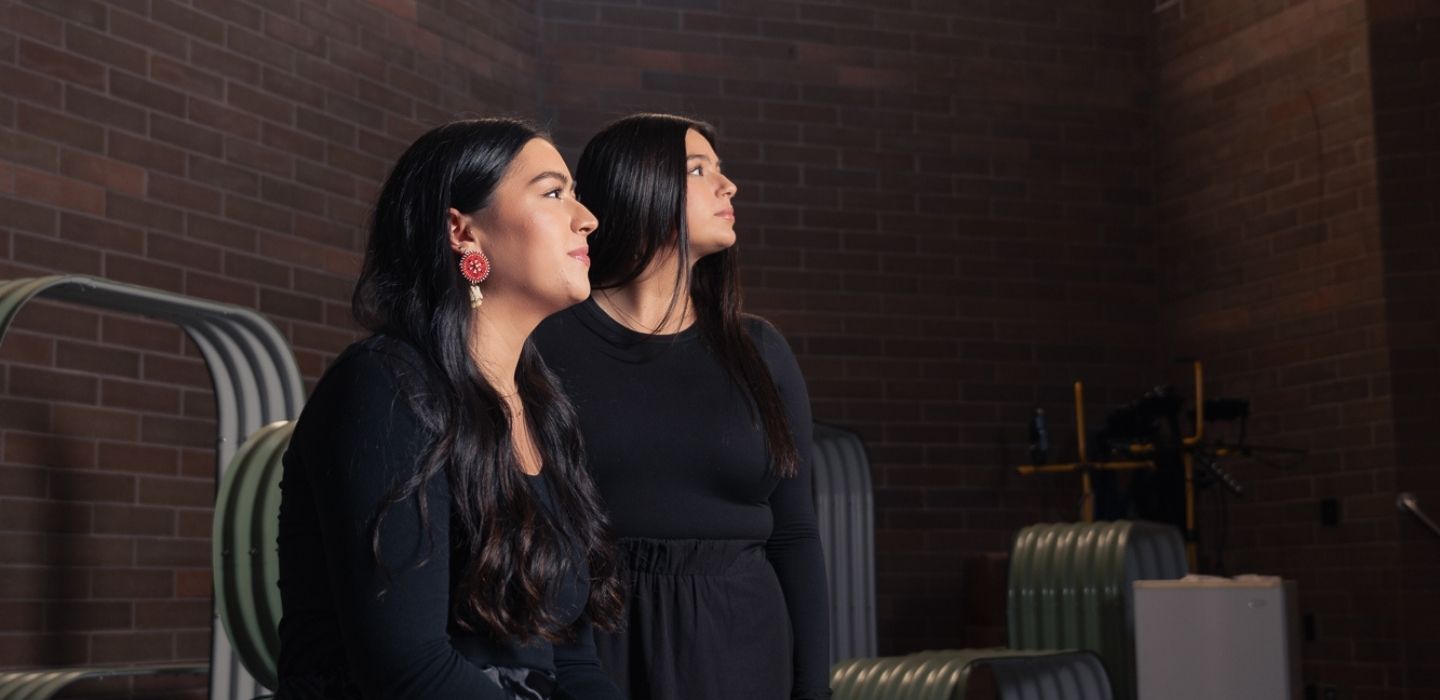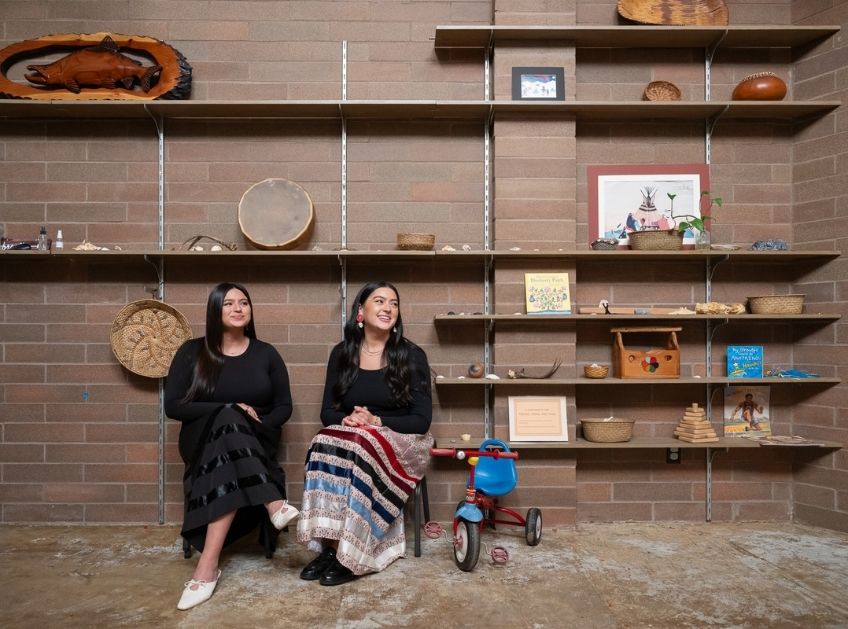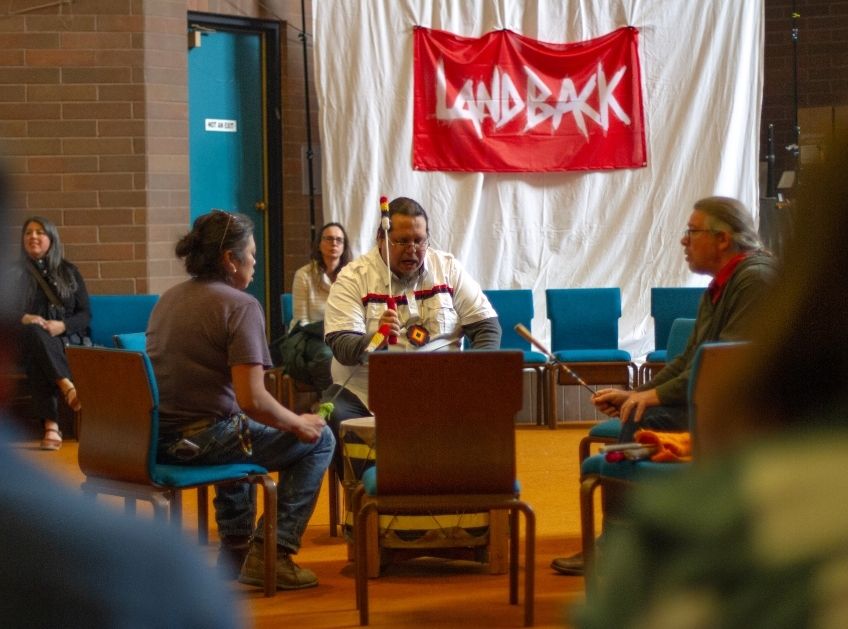FALL 2024
Redemption Story
Indigenous siblings work toward the health and wellbeing of Portland’s Native community.
- Story by Emily Nelson ’19

Photo credit: Mario Gallucci
HOW CAN SOMEONE be houseless in their homeland? It’s a question that motivates sisters and UP alums Whitney and Elizabeth Watson (’23 and ’24, respectively) in their work at Barbie’s Village, a housing and community project in Northeast Portland aimed at addressing the houselessness crisis among Portland’s Native population. As first-generation college graduates and members of the Native Village of Kotzebue and descendants of the Turtle Mountain Band of Chippewa and Umonhon Nation, they see their work as specialists in health equity policy and early childhood as a way of giving back to their community.
“Being able to meet with our community and see that there is a need and that we can help in the capacity we can with the education we’ve received, it’s really a full-circle moment,” Elizabeth says.
Owned by Future Generations Collaborative (FGC), Barbie’s Village is part of an ongoing mission to promote the health and wellbeing of Portland’s Native community. Named after Barbie Jackson Shields, a member of the Confederated Tribes of Warm Springs who passed away in 2017, Barbie’s Village is taking a multi-pronged approach, with services available for everyone in the Portland Native community, from children to elders.
Currently, the space is used for early childhood programming, public health outreach, and community gatherings and events that center traditional meals, cultural activities, and collective healing. They partner with long-established organizations like the Native American Rehabilitation Association of the Northwest, the Native American Youth and Family Center, and the Native Wellness Institute. In the next stages of Barbie’s Village, there will be a series of major renovations, new programming, and the implementation of a new tiny home project, which Whitney calls “the fruition of a shared dream” for FGC and its partners.

Whitney (left) and Elizabeth (right) seated in the library. Photo credit: Mario Gallucci.
The need for housing is great in Portland. According to the 2023 Oregon Statewide Homelessness Estimates, Native people make up 2 percent of the total population but are over 5 percent of the homeless population in Multnomah County, roughly 3.5 times their population share countywide. Twenty-three percent of Native people in Portland live below the poverty line, according to the Oregon Center for Public Policy. “The statistics are alarming, but not surprising,” Elizabeth says. “We’ve all known this, we’ve all seen this in our day-to-day lives. There were a lot of a discussions before Barbie’s Village was established to see where the needs lay, and housing and early childhood services were continuously brought up. Barbie’s Village is a direct response to that.”
Whitney says that the services at Barbie’s Village aim to address some of the other challenges families face due to housing insecurity. “Being able to keep a family together in a safe environment where they can have immediate child care resources, but also have access to resources from other organizations and provide wraparound services for the whole family, including elders, is a big part of the mission,” says Whitney. “We want to set families up for success and set them up for a future in which their children are healthy and thriving.”
Elizabeth, who was a social work major at UP, became involved with FGC while searching for a practicum placement during her senior year. She was offered a paid position in January and moved directly into her role as a family advocate after graduating in May 2024. Whitney, who was a volunteer with FGC at the time, got interested in the possibility of putting her political science minor to work for the organization.
“I realized that this was important work that I could be a part of,” she says. She now works as an interim policy mode lead, supporting health equity at Barbie’s Village alongside her sister. That the siblings have had a chance to work together on a project so personally meaningful to them has been special. “I’ve had a hype girl on my side this whole time, and that’s an amazing part of being able to work with your sister,” Whitney says. “Being able to go to high school together at St. Mary’s, and then going to college together at UP. We were at this point where we’re like, what’s next?”
They credit their family and community for putting them on this shared path. “We’ve been able to cross paths with FGC and be motivated and continuously supported,” Elizabeth says.
“There’s a lot of imposter syndrome that comes along with being Native and being in these spaces, so having that support of people around us that are like, ‘you can do this, we believe in you, we want you to be here.’ It’s something we never really had outside of our immediate family.”
It’s a departure, she says, from a lifetime of learning and working in predominantly white institutions where the sisters were often the only Native students in their classrooms.
“It affects what you think of yourself and where you belong,” Whitney says. “Being able to find a space that fosters belonging has been so healing for me.” Getting to do it alongside her sister is equally important: “We helped and supported each other through those institutions, and now we get to do it together here with the support of others. It’s very validating.”

Whitney and Elizabeth grew up in Vancouver but have always had deep ties to the North Portland area. Their family originally came to the Vanport area in the 1940s to work in the naval shipyards, and moved into North Portland after the 1948 Vanport flood. They call their time at UP a “redemption story.”
“Our families lived on the outside—the borders—of UP,” Elizabeth says. “They’d maybe walk on the sidewalks, but it wasn’t accessible for them to attend.” They see their attendance of, and graduation from, University of Portland as a way of breaking down historical barriers for their family.
“It was a strange dynamic for us, knowing that our family has been and is still on the outskirts, and we were able to graduate within that system and also give back to the community that got us here,” Elizabeth says. “Being at UP, having the opportunity to go there and be a first-generation graduate, it’s so emotional.”
They’re also working with UP professors in the Ethnic Studies department to raise awareness among Native students about resources available to them in the Portland area—Barbie’s Village included.
“Many Native students at UP come from out of state, and they don’t have their community here with them, and it’s very isolating,” Elizabeth says. “So we’re working to bridge the gap between the Native community we’ve been able to foster here and those UP students who are feeling isolated—we’re here for you and we have the resources and the supports to help you with whatever you want to do.”
While primarily a space for Native community and resources, the Watson sisters emphasize that there is a place for everyone at Barbie’s Village, whether that’s as a volunteer, a program participant, or just an enthusiastic ally; all members of the community are invited to visit the space and attend FGC events, which includes movie screenings, discussion panels, and a children’s powwow to celebrate Indigenous Peoples’ Day. As Barbie’s Village moves into its next stages, they envision several expansions that will further the program’s reach, including a food pantry, pop-up vaccination clinics, and even an onsite coffee shop. Most importantly, the sisters hope that community involvement will foster healing—“true healing, not just the talk of healing, but genuine true connections,” says Elizabeth. “That’s the goal.”
EMILY NELSON ’19 is UP’s marketing project specialist.